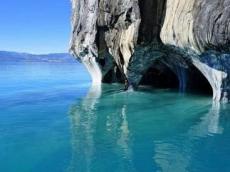|
|
TODAY.AZ / Weird / Interesting
Caves found in Patagonia may unlock secrets of how continents formed
10 March 2014 [11:44] - TODAY.AZ
 Chilean and French scientists have discovered a network of underground caves on a remote island in Patagonia that could provide valuable clues as to how continents were formed.
Chilean and French scientists have discovered a network of underground caves on a remote island in Patagonia that could provide valuable clues as to how continents were formed.The group found the system of around 20 limestone caves this week during a research trip to Diego de Almagro island off the far southwest coast of Chile.
Scientists had to abseil and scubadive to get into the caves, some of which are around 50 meters deep (165 feet). They found wall paintings and bone fragments left by the indigenous Kawesqar people that could help date the caves.
"You can make models of areas where the continents broke off and this could be one of those spots," said speleologist Natalia Morata.
The expedition is the latest in a series by the French Centre Terre association, who have found types of rock in the caves normally found in more temperate zones. That could give clues as to how the continents split apart.
Scientists believe continents move due to plate tectonics, and that the map of the Earth would have looked very different millions of years ago.
/Reuters/
URL: http://www.today.az/news/interesting/131685.html
 Print version
Print version
Views: 2253
Connect with us. Get latest news and updates.
See Also
- 06 December 2024 [22:20]
Are scented candles harmful to health? - 23 November 2024 [14:11]
Magnitude 4.5 earthquake hits Azerbaijan's Lachin - 20 November 2024 [23:30]
Launch vehicle with prototype of Starship made its sixth test flight - 27 October 2024 [09:00]
Fuel prices expected to rise in Sweden - 24 October 2024 [19:14]
Turkiye strikes terror targets in Iraq and Syria - 23 October 2024 [23:46]
Kazakhstan supplied almost entire volume of oil planned for 2024 to Germany in 9 months - 23 October 2024 [22:17]
Taiwan reported passage of Chinese Navy aircraft carrier near island - 23 October 2024 [21:50]
Russia remains largest oil supplier to India - 16 October 2024 [17:54]
Gamesummit co-founder shares insights on future of gaming industry in Azerbaijan [EXCLUSIVE] - 12 October 2024 [18:27]
TikTok cuts jobs, turns to AI for content moderation
Most Popular
 President Ilham Aliyev expresses condolences to President of Montenegro
President Ilham Aliyev expresses condolences to President of Montenegro
 Tehran’s Anti-Azerbaijani Rhetoric Undermines Diplomatic Intentions
Tehran’s Anti-Azerbaijani Rhetoric Undermines Diplomatic Intentions
 Azerbaijan’s MFA extends condolences to Montenegro
Azerbaijan’s MFA extends condolences to Montenegro
 China's operating high-speed railway to hit 60,000 km by 2030
China's operating high-speed railway to hit 60,000 km by 2030
 Sweden sees surge in cocaine seizures amid growing global drug trade
Sweden sees surge in cocaine seizures amid growing global drug trade
 Syrian Transitional Government open to international dialogue, says FM Esad Sheybani
Syrian Transitional Government open to international dialogue, says FM Esad Sheybani
 Death toll rises in Brazil bridge collapse
Death toll rises in Brazil bridge collapse
